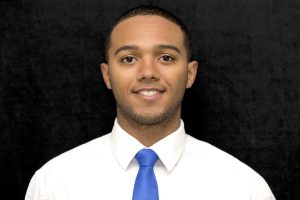
We met up with Christopher Pribilo at the 49th Annual NSBE Convention in Kansas City, Missouri, in March and talked to him about his career, background, and Hopkins education.
Tell us about your job? How did you get involved in your current line of work?
I am a service engineer and stress analyst for the 737NG/MAX airframe engineering team at Boeing. I initially started in the airline industry as a methods and standards engineer at United Airlines. At United, I got extensive experience in repairing Boeing aircraft, which is very valuable to me now. Today, I support the aircraft maintenance programs for airlines around the world.
Your undergraduate degree is in aerospace science and engineering. Why did you decide to pursue a graduate degree in mechanical engineering?
As an undergraduate, I was interested in the principles that made an aircraft fly. The courses that I took in aerodynamics and aircraft stability explained this; however, after entering industry, I understood that an aircraft was far more complex than just aerodynamics. A variety of disciplines contribute to making an aircraft fly. It was my desire to understand how multiple engineering disciplines come together to build a sustainable aircraft that led me to pursue a graduate degree in mechanical engineering.
How did you learn about Johns Hopkins Engineering for Professionals program and decide to attend?
I noted on LinkedIn that several of my colleagues were enrolled in the Engineering for Professionals program and decided to explore more. I was predominantly interested in the solids/mechanics of materials focus area because the courses align with my current work at Boeing.
Describe your experience at EP so far.
The EP Mechanical Engineering program has been a pleasant and challenging experience. I enjoy a comfortable work-life balance where exams and presentations are scheduled on the weekend. My professor holds office hours on Sundays and my classmates are accommodating to my work schedule. This flexibility has allowed me to perform at the highest level academically while meeting my professional work commitments.
How do you expect your new knowledge and skills to impact your job and career?
I hope to use my mechanical engineering degree to work on the next generation of commercial aircraft, contributing to the structures team to ensure that this new aircraft is environmentally friendly, structurally stable, and safe. Additionally, I hope to empower young engineers by teaching at a community college as an adjunct professor.
What advice do you have for aspiring engineers pursuing a similar career path?
I would encourage an engineer interested in the aerospace industry to gain technical knowledge and understand the collaborative environment of the industry. Sharing knowledge and complete dedication to your teammates is vital to advancing our understanding of aerospace phenomena.